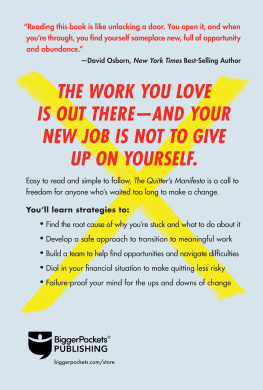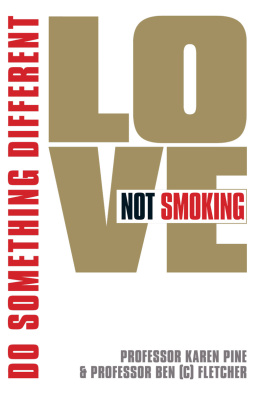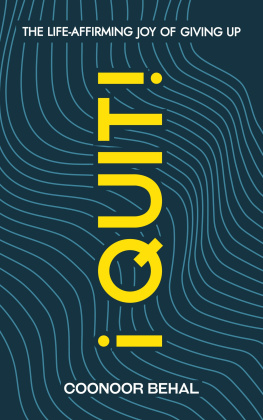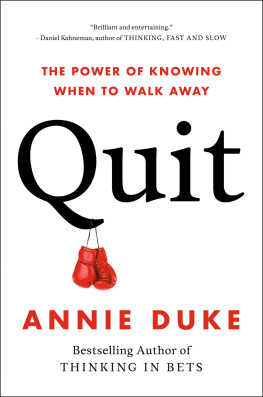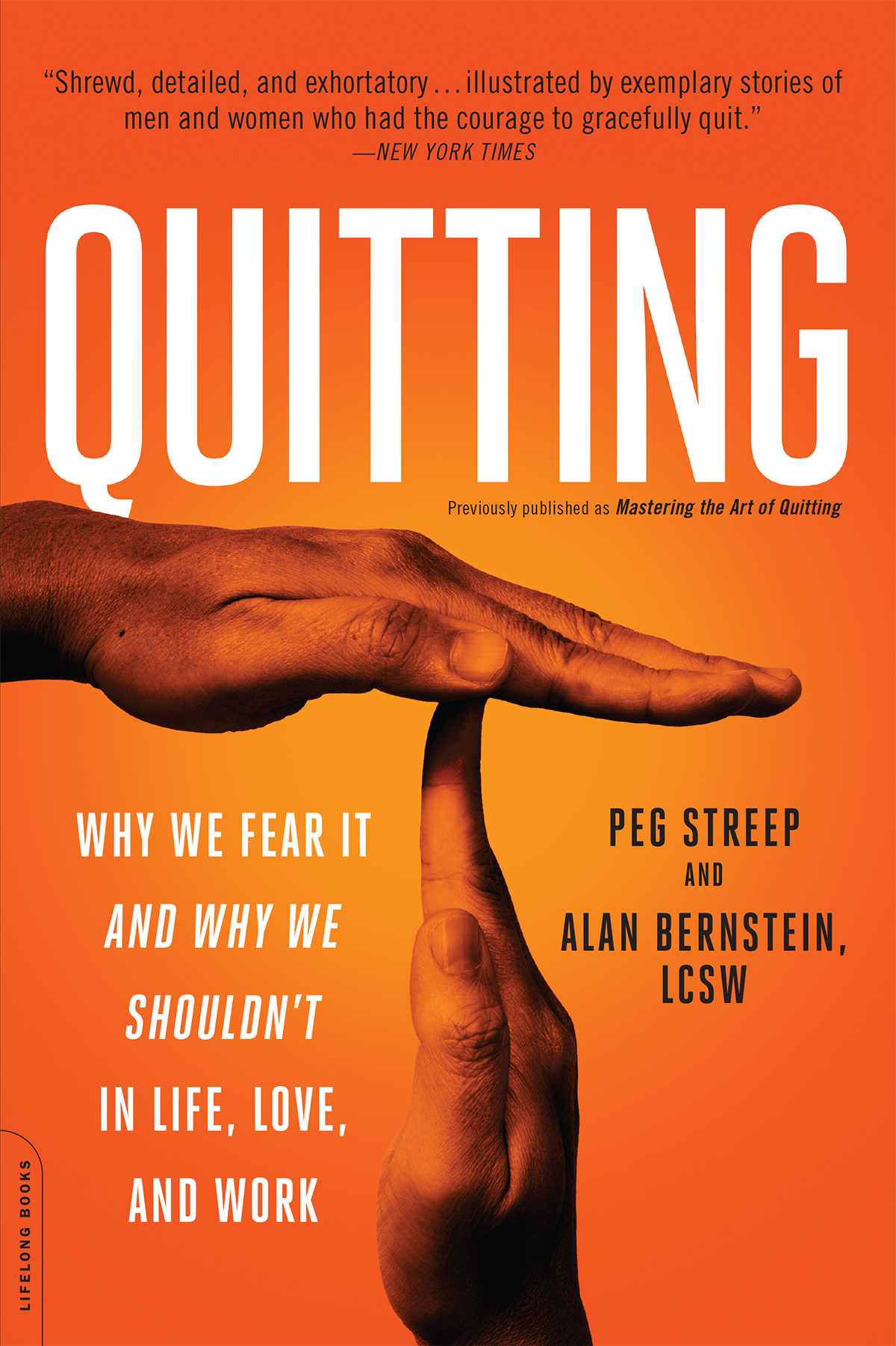Quitting
Quitting
Why We Fear Itand Why We Shouldn't
in Life, Love, and Work
Peg Streep and Alan B. Bernstein, LCSW

A Member of the Perseus Books Group
Copyright 2014 by Peg Streep and Alan B. Bernstein
All rights reserved. No part of this publication may be reproduced, stored in a retrieval system, or transmitted, in any form or by any means, electronic, mechanical, photocopying, recording, or otherwise, without the prior written permission of the publisher. Printed in the United States of America. For information, address Da Capo Press, 44 Farnsworth Street, 3rd Floor, Boston, MA 02210.
Designed by Jack Lenzo
Set in 11 point Garamond by the Perseus Books Group
Library of Congress Cataloging-in-Publication Data
Streep, Peg.
Mastering the art of quitting : why it matters in life, love, and work / Peg Streep and Alan B. Bernstein. -- First Da Capo Press edition.
pages cm
Includes bibliographical references and index.
ISBN 978-0-7382-1855-7 (e-book) 1. Failure (Psychology) 2. Motivation (Psychology) 3. Perseverance (Ethics) 4. Change (Psychology) I. Bernstein, Alan B. II. Title.
BF575.F14S775 2013
158--dc23
2013022265
First Da Capo Press edition 2014
Originally published as Mastering the Art of Quitting: Why It Matters in Life, Love, and Work
First paperback edition 2015
Published by Da Capo Press
A Member of the Perseus Books Group
www.dacapopress.com
Note: The information in this book is true and complete to the best of our knowledge. This book is intended only as an informative guide for those wishing to improve their personal or professional lives through better mental and psychological health. In no way is this book intended to replace, countermand, or conflict with the advice given to you by a therapist, life coach, or health professional. The ultimate decision concerning care should be made between you and your own team of support. We strongly recommend you follow your own counselors or support teams advice. Information in this book is general and is offered with no guarantees on the part of the authors or Da Capo Press. The authors and publisher disclaim all liability in connection with the use of this book. The names and identifying details of people associated with events described in this book have been changed. Any similarity to actual persons is coincidental.
Da Capo Press books are available at special discounts for bulk purchases in the U.S. by corporations, institutions, and other organizations. For more information, please contact the Special Markets Department at the Perseus Books Group, 2300 Chestnut Street, Suite 200, Philadelphia, PA, 19103, or call (800) 810-4145, ext. 5000, or e-mail .
10 9 8 7 6 5 4 3 2 1
For Alexandra Israel, best daughter
Contents
: The Myth of the Little Engine
The Psychology of Persistence
: Unsuccessful Quitting
: Quitting As an Art
: A Talent for Quitting
: Managing Thoughts and Emotions
: Taking Stock
: Mapping Your Goals
: How to Quit Well
: Resetting Your Inner Compass
: The Wisdom of Quitting
Introduction
The Myth of the Little Engine
The premise of Quitting flies in the face of conventional wisdom because American mythology doesnt have room for quitters. In fact, the only kind of giving up we collectively accept and support is quitting a bad habit like smoking or drinking. This book isnt about that.
Quitting proposes that the ability to quit has a place alongside persistence and optimism and that its presence is necessary as a balance to both of those characteristics. Cultivating the ability to quit is especially important because, as well show, human beings are actually hardwired to persist, even when a goal is unreachable. Quitting not only frees us from the hopeless pursuit of the unattainable but permits us to commit to new and more satisfying goals. Learning how to quit is an important, conscious counterbalance to the built-in habits of mind, many of which are unconscious, which keep us committed to a path we would be better off abandoning.
Quitting isnt an end in and of itself. Its the necessary first step to rebooting and redefining your goals, and what you want from life.
We hope that this book will both help change individual attitudes toward quitting and provide a blueprint for those who need help either letting go of an unattainable goal or revising one that is no longer satisfying. The book presents a necessary corrective to a culture that only trumpets the virtue of staying the course.
The Balancing Act
As children, we fall asleep to the rhythms of the Little Engines I think I can, I think I can, which teaches us that both persistence and the power of positive thinking are the keys to success. From the get-go, we learn that winners never quit and quitters never win, along with dozens of other sayings that make it clear that we must hang in and soldier on.
The emphasis put on persistence is part of American mythology, perhaps because the founding of this country demanded itsurviving the first harsh winters in New England, forging west over treacherous and sometimes hostile terrain, having the gumption to set out for thousands of miles and stick it out. Tenacity provides the backbone for the American Dreamwhether its the rags-to-riches climb, the come-from-behind victory, or a variant of Rocky the fighter facing down the odds.
Seeing persistence as the key to success is also democratic. If hanging in there is whats required, then all the other characteristics and advantages one person might have over anothereducation, class, privilegeare taken off the table.
Where the ancient Greeks saw Sisyphus, Americans see a potential hero in the making.
The Little Engine and its grownup counterparts dominate the collective thinking so completely that we like our success stories mixed with at least a dash of failure and preferably a pinch of impossible odds so that in the telling, persistence comes to the fore. Would we admire Thomas Edisons invention of the light bulb as much if hed succeeded on the first try? The answer is that we wouldnt because we admire people who come from behind, as witnessed by twenty-five years of Oprah, not to mention innumerable news stories, books, and movies. Persistence makes heroes of animals toothink of Seabiscuit, or the occasional dog or cat that travels a thousand miles to find its way home.
In all of its iterations, the resolve-equals-success formula spawns other cultural tropes, not the least of which is that failure followed by renewed effort is intrinsic to success. Its not a surprise that the YouTube video Famous Failures has been watched millions of times and reposted on Web sites all over the Internet. Its message? If you havent failed, you havent lived.
Its a comforting thought. We put on these stories like a fighters capeStephen Kings thirty rejections and four unpublished novels, Steve Jobss failed Next computer, and many others like themwhen we set new goals for ourselves. We tell ourselves that the cultural hum in our headsthe mantra of I think I can combined with a chorus of If at first you dont succeed, try, try againwill see us through.
Our belief in the value of persistence colors the way we tell our own stories and the lessons we take away from the stories were told. This belief is so interwoven into our way of looking at life that its hard to see it any other way.
Theres only one problem. No matter how many times we watch Rocky bound up those steps, persistence alone isnt a surefire formula for success. In fact, our reliance on tenacity narrows our field of vision in important ways because our brains are already wired to support it. In addition, each of us has innate habits of mind that steer us toward commitment and away from quitting, regardless of how remote the possibility of success.


